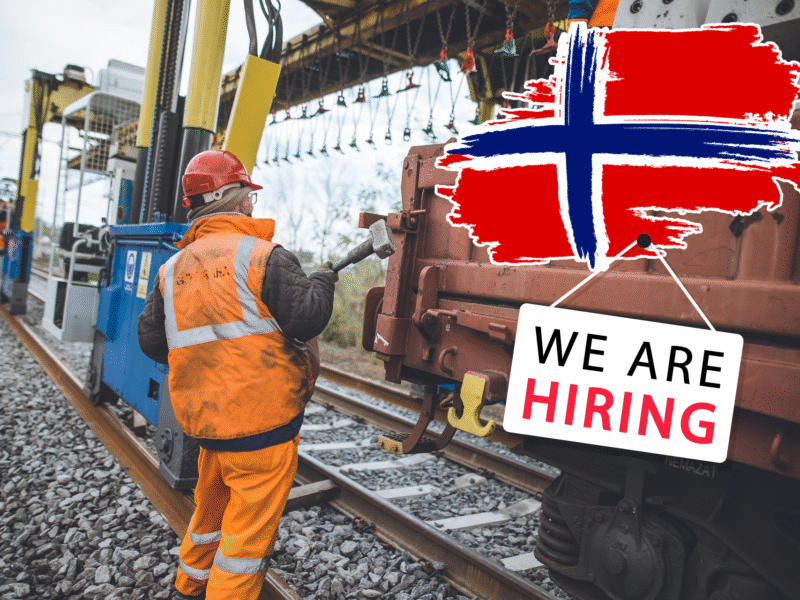Norway has grown to become one of the most attractive countries in Europe for skilled and unskilled foreign workers seeking stable job opportunities. With its high living standards, modern infrastructure, and transparent labor laws, it offers a reliable environment for immigrants looking to build a better life.
The Norway employment visa is the legal route for non-EU/EEA nationals who wish to secure long-term jobs and residency in the country. The visa allows foreign workers to live and work in Norway under specific conditions, usually based on their qualifications, work experience, and a valid job offer from a Norwegian employer.
The process of obtaining a work visa in Norway involves several steps, including eligibility checks, securing employment, documentation, and formal submission of your application through the appropriate channels.
Many immigrants looking to earn competitive salaries and benefit from Norway’s welfare and health system choose this route as a gateway to financial stability. With several sectors in urgent need of labor, from healthcare and construction to IT and hospitality, the employment visa remains one of the most sought-after immigration routes.
As global demand for foreign labor increases, particularly in high-income countries like Norway, more applicants are seeking clear guidance on how to meet the visa criteria and secure job placements.
This article outlines everything you need to know about getting a Norway employment visa—from eligibility to job search strategies—ensuring you are fully equipped for success.
Why Consider Working in Norway?
Choosing to work in Norway opens the door to a secure lifestyle, professional growth, and access to one of Europe’s most stable job markets. The country has a strong economy supported by oil, gas, marine, and technology industries, making it an attractive destination for immigrants looking to earn a decent living.
Foreign workers in Norway enjoy fair employment practices, predictable work hours, generous annual leave, and social welfare benefits that support both workers and their families.
Norway is consistently ranked among the top countries for quality of life, with low crime rates, free education, and comprehensive healthcare services.
In addition to economic stability, the country boasts a healthy work-life balance, which is one of the key reasons why foreign workers prefer to relocate here. You are not just moving for jobs, but also for the opportunity to live in a society that values equality, safety, and sustainability.
Another important reason to consider working in Norway is the high wage structure. Even for entry-level jobs, workers can expect a salary that is significantly higher compared to many other European countries.
This makes it easier for immigrants to support families back home, save money, and build a future in one of the wealthiest countries in the world. Furthermore, the Norwegian government actively supports foreign workers, offering integration programs and language classes to help immigrants settle in faster.
Whether you’re a nurse, electrician, chef, or software developer, Norway has openings across various industries that are eager to employ foreign talent. The ease of obtaining residency after a certain period of work also makes this a long-term solution for those who want to transition from temporary employment to permanent settlement.
Entry-level Skills and Experience Required
For foreign nationals applying for jobs in Norway through the employment visa route, the range of skills required can vary significantly depending on the industry and role. However, the country offers several entry-level positions that don’t demand extensive experience, especially in sectors facing labor shortages.
Industries such as agriculture, hospitality, eldercare, construction, and retail often accept applicants with minimal formal training or prior experience, provided they show a willingness to learn and a good attitude toward work.
One of the key things employers in Norway look for in entry-level workers is reliability. Even for jobs that are considered unskilled, like dishwashing, fruit picking, or housekeeping, consistency and a strong work ethic can set applicants apart.
In customer-facing roles, employers also value communication skills and cultural sensitivity, particularly in urban centers where businesses cater to international clients.
Additionally, having basic digital skills can improve your chances. Many entry-level roles now require the ability to operate basic computer systems, input information, or communicate via email. These are not advanced technical skills, but they show employers that you are adaptable to modern work environments.
Practical abilities are also highly valued. For example, those applying for entry-level construction jobs should know how to use basic tools, follow instructions accurately, and comply with safety regulations.
In the care sector, showing empathy, patience, and a basic understanding of caregiving can make a big difference during the hiring process. Employers may also consider volunteer experience as a relevant background if you don’t have formal employment history.
For those without European qualifications, many employers are open to giving trial employment contracts that could lead to longer-term roles if the worker proves themselves. These short-term contracts can also be used as supporting documents when applying for a full employment visa, provided they meet the salary and hour requirements set by Norwegian authorities.
Qualification and Language Requirements for Immigrants in Norway
For immigrants looking to work legally in Norway, qualifications and language proficiency are crucial factors in the visa approval process. The specific requirements depend largely on the type of job you are applying for, but in general, most skilled positions will require proof of relevant educational qualifications or vocational training.
These qualifications must be recognized in Norway, which sometimes means getting your documents evaluated by the Norwegian Agency for Quality Assurance in Education (NOKUT).
For regulated professions like healthcare, teaching, and engineering, formal recognition of your qualifications is non-negotiable. In these cases, applicants must submit translated and certified copies of diplomas, licenses, or certificates.
Some professions may also require licensing by Norwegian regulatory bodies before you can legally work in the country. For example, nurses must be registered with the Norwegian Directorate of Health to be employed in hospitals or care homes.
Language is another critical aspect of working in Norway. While some multinational companies operate in English, most Norwegian employers prefer or require workers to have at least a basic understanding of the Norwegian language.
This is especially important in healthcare, education, and service industries where communication with locals is essential. For entry-level jobs, employers may be more lenient, but learning the language significantly increases your employability and helps with social integration.
There are many government-sponsored Norwegian language programs available for immigrants. Enrolling in one of these programs not only improves your communication skills but also demonstrates to employers and immigration officers that you are committed to living and working in Norway long-term. Some visa categories even require proof of language course enrollment as part of the application process.
In addition to language and qualifications, some jobs may require police clearance certificates, health reports, or proof of previous employment. These documents should be prepared in advance and translated into Norwegian or English to meet application standards.
Visa and Work Permit Requirements for Immigrants in Norway
Norway operates a structured system for employment immigration, and all non-EU/EEA nationals must apply for a residence permit to work in the country.
This permit acts as both a visa and a work authorization, allowing foreign nationals to reside in Norway for the duration of their employment contract. To qualify for this permit, applicants must meet several key conditions set by the Norwegian Directorate of Immigration (UDI).
The most important requirement is a job offer from a Norwegian employer. The job must be full-time and meet minimum salary levels determined by the government.
For skilled workers, this usually means a salary of around NOK 450,000 or more annually, depending on the industry and position. Entry-level jobs with lower salaries may still qualify, provided the employer can prove that the wage aligns with union agreements or standard industry rates.
The job offer must be concrete, meaning it must include a signed contract that clearly outlines your job title, responsibilities, salary, work hours, and duration of employment. This contract will be one of the main documents evaluated by immigration officers when processing your visa.
Applicants must also prove that they have the qualifications required for the job. This includes educational diplomas, certificates, or vocational training relevant to the position. If the job does not require formal education, such as cleaning or warehouse jobs, then proof of relevant experience or skills may suffice.
Work permits are usually valid for the duration of your employment contract, up to a maximum of two years. They can be renewed, and after three years of continuous work, you may be eligible for permanent residency. Family members may also apply to join you under the family reunification program, provided you meet the financial support requirements.
The application process can be done online via the UDI portal, but applicants must also visit a Norwegian embassy or consulate in their home country for biometric submission. In some cases, the employer may assist with parts of the process, especially if they are approved sponsors.
Documentation and Application Requirements for Immigrants in Norway
To apply for an employment visa in Norway, foreign applicants must prepare a full set of required documents, which are submitted as part of their residence permit application. Having all the right paperwork is crucial to avoid delays or rejections. The process begins with creating an application on the UDI website, where you’ll select your visa type and fill in your personal details.
The most important document is a signed job offer or employment contract from a Norwegian company. This contract must clearly specify your job title, duties, salary, and length of employment. It must also confirm that the position is full-time, as part-time jobs do not usually meet visa requirements for foreign workers.
Next, you’ll need to submit your passport and passport-sized photos that meet biometric standards. The passport must be valid for at least six months beyond your intended stay in Norway. A copy of all used pages in the passport should also be included.
Proof of educational qualifications, translated into English or Norwegian, is another essential requirement. These documents should be certified by the issuing institutions or verified by relevant educational authorities. For skilled positions, you may need a statement from NOKUT to confirm that your degree is equivalent to a Norwegian standard.
Additional documentation includes your CV, police clearance certificate from your country of residence, and sometimes a health certificate if required by your job category. Proof of accommodation and travel plans might also be requested, although this is not mandatory for all employment categories.
Once all documents are ready, you’ll pay the application fee online and book an appointment at your nearest Norwegian consulate or VFS center. During the appointment, you’ll provide biometric data and hand over physical copies of your documents. Processing times vary but usually take between one to three months, depending on the volume of applications.
It is advisable to keep a copy of every document you submit and track your application status online. If approved, you’ll receive a visa sticker in your passport and instructions on how to register with the local police in Norway upon arrival.
Entry-Level Jobs for Immigrants in Norway
Norway’s job market offers a range of opportunities for immigrants, especially in roles that do not require advanced qualifications. These entry-level jobs are in high demand across various sectors due to ongoing labor shortages, demographic shifts, and an aging population.
For immigrants looking to enter the Norwegian workforce quickly and begin earning a competitive salary, these roles offer a clear path to both temporary and long-term employment.
One of the most accessible sectors is the hospitality and tourism industry. With Norway’s growing appeal as a travel destination, hotels, restaurants, and resorts are frequently on the lookout for staff.
Immigrants can find positions as waiters, kitchen assistants, cleaners, and receptionists. While some roles may prefer Norwegian speakers, many international businesses in urban areas operate primarily in English, reducing the language barrier for foreign applicants.
The agriculture sector also provides numerous seasonal and full-time jobs for immigrants. Fruit picking, greenhouse labor, and general farm work are in constant demand, especially during harvest periods.
These roles are ideal for new arrivals since they typically require minimal formal experience and offer on-the-job training. Employers in this sector often provide accommodation and transportation, which helps workers save money and settle in more easily.
Another growing area is the care industry. Norway faces a shortage of caregivers for its elderly population. While certain roles like nursing require formal qualifications and licensing, entry-level jobs such as healthcare assistants or home support workers are accessible to foreigners with basic training and a compassionate disposition. Employers may even support language training for promising candidates willing to work long-term.
In major cities like Oslo, Bergen, and Stavanger, immigrants also find opportunities in logistics and delivery. E-commerce companies, warehouses, and courier services regularly hire delivery drivers, packers, and inventory assistants.
These jobs usually require a clean criminal record and physical fitness, and while they are physically demanding, they come with decent pay and opportunities for career advancement.
Cleaning services remain one of the most immigrant-friendly job sectors. Whether in residential, commercial, or industrial spaces, cleaning companies often hire foreigners on permanent or rotational contracts. These roles offer stability and can lead to supervisory positions for dedicated workers over time.
For many immigrants, these entry-level jobs act as stepping stones. They provide initial income, expose workers to Norwegian workplace culture, and offer a foundation for career growth. Many immigrants begin with such jobs while pursuing language training or upgrading their qualifications for better-paying roles in the future.
Regions with the Highest Payment Structures
While Norway offers competitive wages across the board, earnings can vary significantly depending on the region, industry, and employer. Immigrants aiming to maximize their income should consider relocating to areas known for higher salary structures and strong labor demand. These regions not only pay more but also offer a better chance of securing long-term employment and accessing essential services.
Oslo, the capital city, stands out as the top-paying region in Norway. It is home to major corporations, government institutions, and international organizations. Jobs in finance, IT, healthcare, and consulting tend to offer the highest salaries in this area.
Entry-level jobs also come with higher pay compared to other regions due to the high cost of living. Immigrants working in hospitality, delivery, or caregiving in Oslo often earn more per hour than their counterparts in rural areas.
Stavanger is another high-income region, especially for those working in the oil and gas sector. Known as Norway’s energy capital, it houses several global energy firms and contractors who regularly hire foreign engineers, technicians, and support staff. Wages in this sector are among the highest in the country, and even administrative or site support roles can pay well above the national average.
Bergen, the gateway to Norway’s fjords, offers attractive pay structures, particularly in tourism, maritime, and fisheries. The city’s growing port economy and strong seafood exports have created numerous jobs for foreign labor. With the rising demand for sustainable fish farming and seafood processing, immigrant workers find stable and well-paying jobs in and around Bergen.
Tromsø, in northern Norway, is increasingly popular for seasonal workers and those in research or public services. While the cost of living here is slightly lower than in Oslo, government-supported incentives and remote allowances help workers earn a comfortable wage. Healthcare workers, construction staff, and hospitality employees often find good opportunities in this region.
It’s also worth noting that rural municipalities sometimes offer relocation bonuses or subsidized housing to attract foreign workers. These regions face depopulation and need labor in sectors like healthcare, education, and agriculture. While base wages may not match urban levels, the added benefits can make these positions financially appealing for immigrants seeking a simpler lifestyle.
Understanding regional salary dynamics helps immigrants make informed decisions. By targeting areas with better pay and employer incentives, foreign workers can accelerate their financial growth and even save enough to support family reunification or invest in permanent settlement options.
Salary Expectations for Immigrants in Norway
Norway is known for its strong wage policies and labor protections, which ensure that workers, including immigrants, receive fair compensation for their efforts.
Whether you are a skilled professional or starting with an entry-level job, salary expectations in Norway are generally higher than in most other European countries. However, it’s essential to understand how wages are structured to set realistic financial goals before applying for jobs or visa permits.
For entry-level positions, the average monthly salary typically ranges from NOK 27,000 to NOK 35,000 before taxes. Roles in sectors such as cleaning, agriculture, caregiving, and retail fall into this category. Though the starting pay may seem modest compared to skilled jobs, the cost of living in Norway is offset by free healthcare, education, and various social welfare programs.
Skilled professionals, including nurses, engineers, IT specialists, and electricians, can expect to earn anywhere between NOK 40,000 and NOK 70,000 per month, depending on their level of experience and location.
Specialized roles in oil, gas, and finance often exceed these figures, with some professionals earning over NOK 100,000 per month in high-demand periods or remote areas with special allowances.
Minimum wage in Norway is not fixed by law but is determined by collective agreements between employers and labor unions. These agreements ensure that even the lowest-paid workers receive a living wage that covers basic expenses. For immigrants, this offers a safety net and guarantees fair pay irrespective of your job category.
It is important to note that your salary offer must meet certain thresholds to qualify for an employment visa. For most full-time jobs, the minimum acceptable annual salary is approximately NOK 450,000, although this may vary depending on the occupation and industry. Meeting this threshold is necessary not only for visa approval but also for future applications like permanent residency or family reunification.
Taxation in Norway ranges between 22% and 38%, based on your income level and deductions. However, immigrants benefit from various tax credits and allowances, including deductions for work-related expenses and rent. Moreover, the high cost of taxation is justified by the comprehensive welfare system that includes healthcare, unemployment benefits, and retirement savings.
With careful budgeting and financial planning, many immigrants are able to save a portion of their income, send remittances back home, or invest in education and property. The combination of fair wages, labor protections, and long-term earning potential makes Norway a solid choice for those seeking stable and rewarding employment overseas.
How to Find a Job in Norway as an Immigrant
Finding a job in Norway as an immigrant requires a strategic approach, especially if you are applying from outside the country. Fortunately, the Norwegian government, recruitment agencies, and employers have made it easier for foreign workers to explore opportunities through transparent job portals and structured hiring processes.
Knowing where to search and how to present your application can significantly improve your chances of getting hired and receiving visa sponsorship.
The official job portal nav.no, operated by the Norwegian Labour and Welfare Administration, is a great place to begin your job hunt. It lists thousands of vacancies across various industries, including those that regularly hire foreign workers.
You can filter results based on location, language requirements, and contract type. Many of these listings are in English, which is helpful for newcomers who are not yet fluent in Norwegian.
International job platforms such as EURES, Indeed, and LinkedIn also have postings from Norwegian employers seeking foreign talent. These platforms often provide the option to apply directly online and include useful information about the employer, job requirements, and salary expectations.
When applying, make sure to tailor your CV and cover letter to reflect the Norwegian format—brief, clear, and focused on relevant experience.
Recruitment agencies specializing in foreign labor are another helpful resource. Agencies like Adecco, Manpower, and Jobzone regularly assist employers in finding skilled and unskilled workers from abroad.
These agencies often support you through the application process, help prepare your documentation, and provide language and integration training after arrival.
Networking can also be a powerful tool for job seekers. Joining online forums, Facebook groups, or LinkedIn communities focused on Norway immigration and employment can connect you with people who have already gone through the process. Some job offers are shared informally through such networks before being posted publicly.
Attending job fairs, either physically or virtually, also increases your chances of interacting directly with Norwegian employers.
These events often include representatives from companies, immigration lawyers, and municipal officials who provide job listings and legal guidance. Many participants have been able to secure interviews or job offers directly through these platforms.
Lastly, if you are already in Norway on a visit or study visa, you may find opportunities through local newspapers, community centers, or by directly approaching businesses. Many small- and medium-sized companies are open to hiring immigrants and can offer sponsorship if you prove to be a valuable asset.
Persistence, preparation, and the right strategy are key. With a valid job offer, your path to securing a work visa becomes much more straightforward, and you’ll be on your way to starting a new chapter in one of the most desirable countries for employment in the world.






